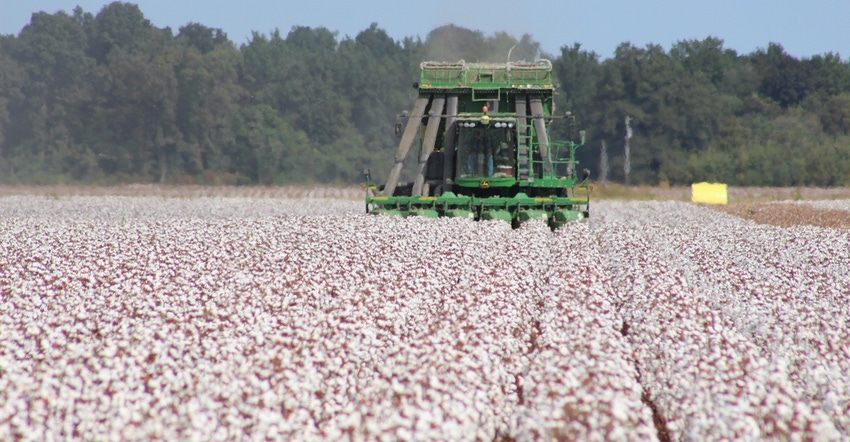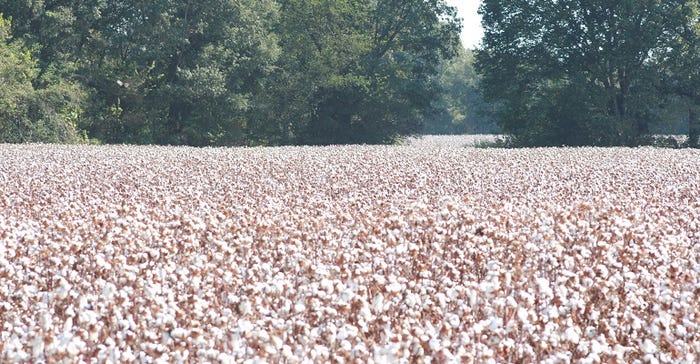December 1, 2019

Sponsored Content
For the last two seasons, Doug Scott has produced top cotton yields on his farm outside of Sikeston, Missouri. Excellent growing conditions contributed to high yields, but Scott has seen a sustained uptick in production that goes beyond sunshine and timely rains.
He also credits cotton varieties with better in-plant protection against pests for improved yield consistency.
“With the PhytoGen W3FE varieties, I get protection against root-knot nematodes, bollworms and bacterial blight – in the seed,” Scott said. “It’s not a seed treatment or a chemical application. The total package comes in the seed.”
Every new PhytoGen® brand variety comes with transgenic traits and native breeding traits to protect yield potential in Southern cotton fields. For example, WideStrike® 3 Insect Protection offers three-gene Bt protection against lepidopteran pests, such as cotton bollworm, tobacco budworm and armyworm. The Enlist™ cotton trait enables weed control with tolerance to 2,4-D choline, glyphosate and glufosinate. And PhytoGen Breeding Traits™ provide season-long protection against root-knot nematodes and bacterial blight.
When yield-robbing pests are removed from the equation, plants can more consistently reach their genetic yield potential. It also means growers don’t have to spend as much time and money managing crop inputs.
“For the last two years, we have not had to spray our PhytoGen W3FE varieties for bollworms, and virtually all of the competitive varieties in the area were sprayed – once or twice,” Scott said. “Not having to spray for bollworms certainly adds value.”
PhytoGen Cotton Development Specialist Chad Brewer, Ph.D., conducts variety trials and works with growers in the Missouri Bootheel and Arkansas. He says the newer PhytoGen W3FE varieties demonstrate high yield consistency throughout the Midsouth, both in company and third-party Extension trials.
“PhytoGen had the top-yielding 3-gene Bt variety in the 2018 OVTs in Missouri, Arkansas, Tennessee, Mississippi and Louisiana,” Brewer said. “And it wasn’t just one variety that performed well across the board. We have a deep portfolio with the W3FE trait package and PhytoGen Breeding Traits.”
PhytoGen® brand PHY 430 W3FE yielded more cotton in Arkansas, Missouri and Tennessee OVTs than any commercial Deltapine B3XF variety. In the Mississippi Small Plot Variety Trials, PHY 390 W3FE was the highest-yielding variety in the Delta locations. In Louisiana, a PhytoGen W3FE experimental variety won the seven-location trial by nearly 50 pounds. It will be commercialized in December 2019.
“We continued to see excellent performance of PhytoGen W3FE varieties in 2019, and we expect our portfolio to again stand out among 3-gene Bt varieties when the Midsouth OVTs are published in January 2020.”

Protection against root-knot nematodes
Chris Main, Ph.D., PhytoGen Cotton Development Specialist for Tennessee and northern Alabama, says PhytoGen is also leading the industry with its PhytoGen Breeding Traits. He works with many growers who have heavy root-knot nematode (RKN) soils, and they are gaining major yield increases with new RKN-resistant varieties from PhytoGen.
“Our two-gene RKN-resistant varieties offer the very best protection against root-knot nematodes in the cotton industry,” Main said. “Growers who planted varieties such as PHY 350 W3FE and PHY 480 W3FE on fields with historically heavy nematode infestations often produced record-high yields for those acres. We saw increases of more than 100 pounds per acre in some fields, compared with historical averages.”
This yield protection from RKN also was evident in Extension variety trials. For example, PHY 350 W3FE averaged a 129 pound/A yield advantage over DP 1823NR B2XF – a variety marketed as nematode resistant – across all northern Midsouth 2018 OVT locations.
“With the 2019 harvest, we continue to see this performance in trials and on growers’ farms. PhytoGen has differentiated itself from the competition in terms of yield protection and yield consistency,” Main said. “PhytoGen W3FE varieties include protection against major pests so they can make the most of their high-yielding genetic potential.”
For more information on PhytoGen W3FE varieties, WideStrike® 3 Insect Protection and PhytoGen Breeding Traits, go to www.PhytoGen.com.
™ ® PhytoGen, PhytoGen Breeding Traits and the PhytoGen Logo are trademarks of PhytoGen Seed Company, LLC. ™ ® Enlist and WideStrike are trademarks of Dow AgroSciences, DuPont or Pioneer, and their affiliated companies or their respective owners. The Enlist weed control system is owned and developed by Dow AgroSciences LLC. PhytoGen Seed Company is a joint venture between Mycogen Corporation, an affiliate of Dow AgroSciences LLC, and the J.G. Boswell Company.
About the Author(s)
You May Also Like




